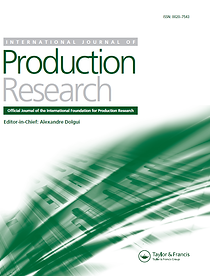

International Journal of Production Research
Sustainable manufacturing using Zero Defect Manufacturing (ZDM):
A method for quality assurance and zero waste
Guest editors
-
Foivos Psarommatis, University of Oslo, Norway. Email: foivosp@ifi.uio.no
-
Victor Azamfirei, Mälardalen University, Sweden
-
Vittorio Solina, University of Calabria, Italy
-
Gokan May, University of North Florida, USA
-
Hongbae Jun, Hongik University, South Korea
Submission timeline and instructions
December 31st, 2024
Please select the special issue option "Sustainable manufacturing using Zero Defect Manufacturing" on the submission form.
Topics
-
Quality assurance
-
Quality improvement
-
Predictive maintenance
-
Quality inspection technologies
-
Digital technologies for quality prediction
-
Virtual metrology
-
Dynamic scheduling
-
Decision making
About the issue
The increase in global competitiveness challenges the manufacturing market to integrate design, manufacturing, and product in order to improve the quality of both the product and the process. In today’s market, even large companies need flexibility and also need to increase the level of sustainability of their systems and processes.
Thus, in recent years, the focus on smart manufacturing systems is pushing companies toward a new variety of highly specific technical solutions. In the area of quality management is Zero Defect Manufacturing (ZDM) that combines all the best features of traditional quality management methods but also incorporates all the new digital technologies that Industry 4.0 and 5.0 can offer. These solutions are characterized by an integrated approach to manufacturing termed “digital manufacturing”. In fact, digital manufacturing systems often incorporate optimization capabilities to reduce time, cost, and improve the efficiency of most processes.
Despite the recognition of importance for digital manufacturing, most organizations feel they lack the necessary capabilities. The digital revolution is now our “present” is not the future. There are many different tooling processes that digital manufacturing utilizes such as artificial intelligence, automation and robotics, additive technology, and human-machine interaction, IoT, etc. The metaverse has recently been added to these tools becoming an increasingly popular form of collaboration within virtual worlds. The tools characterizing digitization are destined to evolve and increase.
In any case, these tools are unleashing innovations that will change the nature of manufacturing itself. Industry and academic leaders agree that digital manufacturing technologies will transform every link in the manufacturing value chain, from research and development, supply chain, and factory operations to marketing, sales, and service. This transformation is known as fourth industrial revolution, also referred to as Industry 4.0 but the real new trend refers to Industry 5.0, the future, already penetrating trend, of change processes directing towards closer cooperation between man and machine, and systematic prevention of waste and wasting including industrial upcycling.
The aim of this special issue to curate a body of research from academics and practitioners providing significant insights in the context of Industry 4.0 towards Industry 5.0 to solve complex problems in the field of manufacturing planning, management, and control.